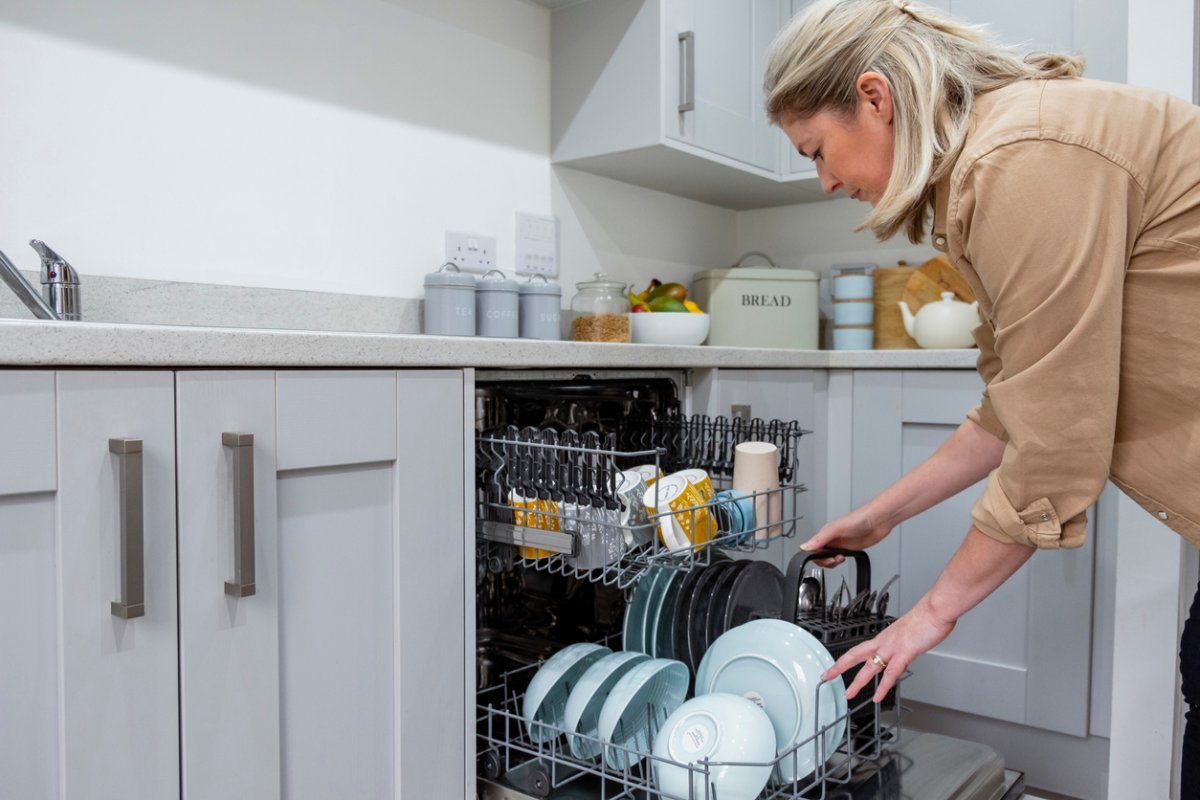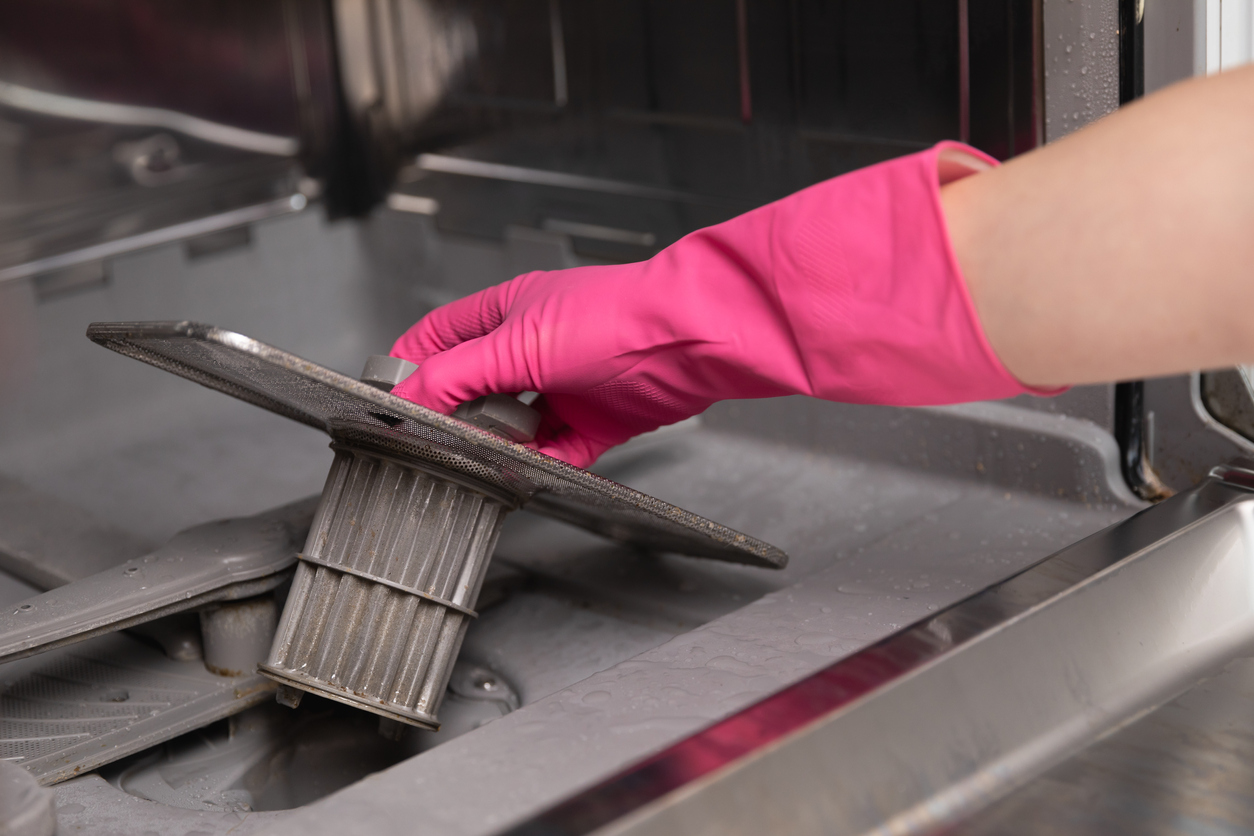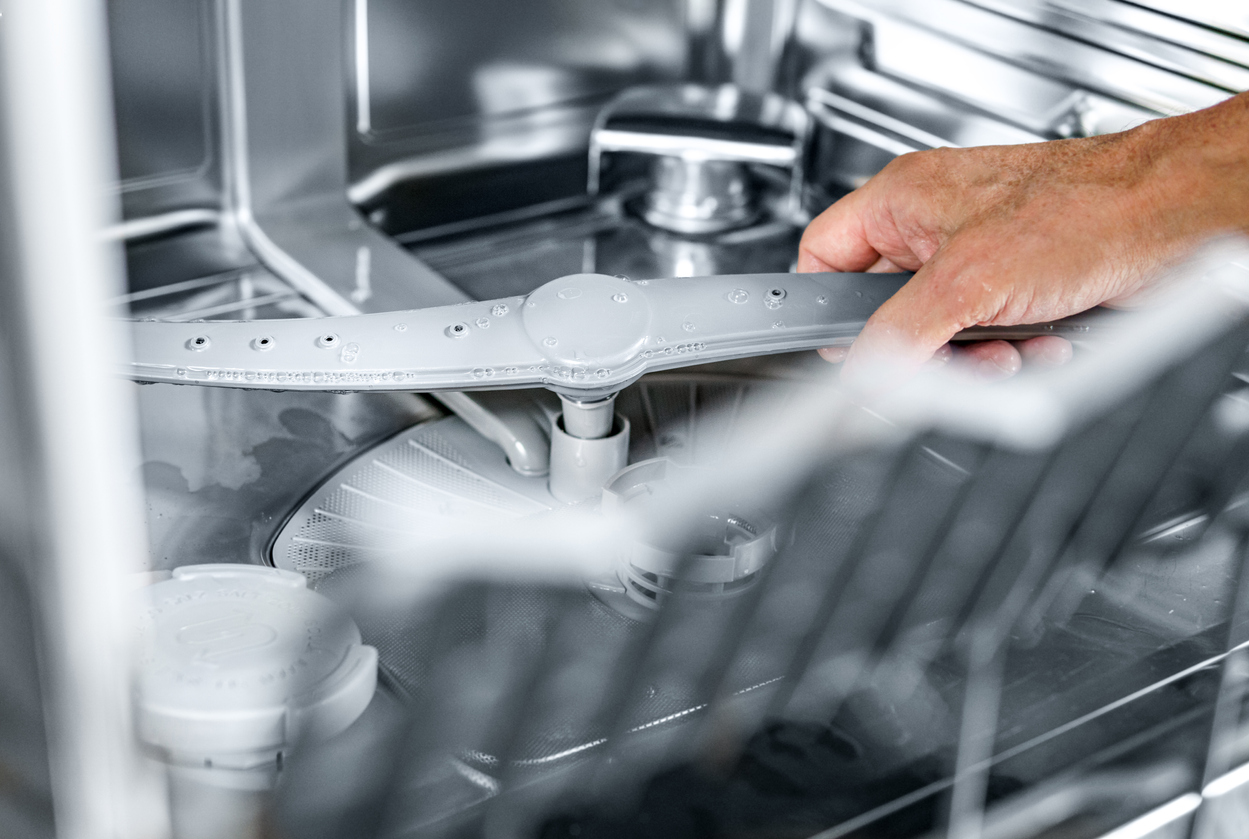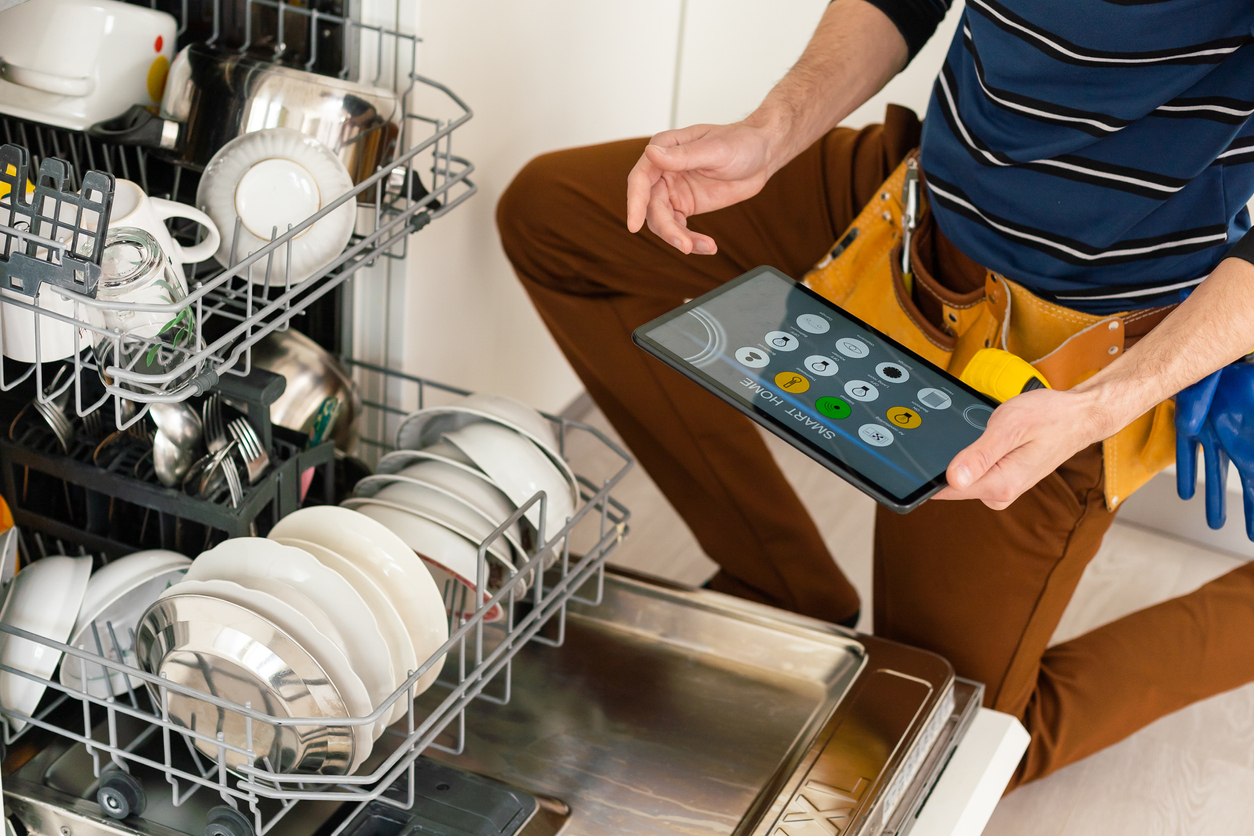

We may earn revenue from the products available on this page and participate in affiliate programs. Learn More ›
Q: My home’s dishwasher is usually pretty quiet, but lately I’ve noticed some unusual sounds when I run it, like thumping and scraping. Why is my dishwasher making loud noises, and how do I fix it?
A: In many households, the gentle hum of a dishwasher at work is a familiar and often comforting sound. Yet when that quiet purr escalates to a disruptive roar, it can cause concern for homeowners.
A dishwasher’s noise level is typically measured in decibels (dB). Most models average about 40 to 50 dB, with the quietest dishwashers operating on the lower end of that range. However, over time and with regular use, the components can wear out or become misaligned, which may lead to louder operations.
Sometimes a noisy dishwasher can simply be the result of incorrect loading. The cycle may also be louder if there are not many dishes in the unit. But if the dishwasher is consistently making unusual sounds, it’s likely that one or more parts are malfunctioning and may be in need of repair. Many homeowners rely on their dishwashers every day, so understanding the reasons behind an unexpectedly noisy unit can be vital for restoring a home’s peace and quiet and preventing further damage. There are several potential causes for a dishwasher making a loud noise, and most can be addressed without having to replace the unit entirely.
It’s often possible to diagnose dishwasher issues based on the kind of noise the unit is making. For example, a buzzing sound typically indicates a clogged drain pump.
When homeowners notice their dishwasher sounds louder than usual, the specific noise it’s making can help narrow down the possible problem. For example, when food waste, debris, or foreign objects obstruct the unit’s drain pump, it can manifest as a buzzing sound before and after the wash cycle. Some models also have a part called a drain pump solenoid, which closes and opens at various points of the cycle to control water flow. If a blockage causes the solenoid to get stuck in one of these positions, this can also cause the unit to buzz.

While sometimes all that is needed to fix the situation is to unclog the dishwasher, in other cases the malfunctioning drain pump may need more significant repairs. Signs that a drain pump might be bad include poor water drainage, dishes not coming out clean after a full cycle, or even pooling water at the bottom of the appliance after a cycle is complete. The unit might also display error messages or codes indicating a pump failure.
Hearing thumping or knocking while the dishwasher is draining can mean that the unit’s drain hose is loose.
The drain hose allows water to flow in and out of the dishwasher at various points in the cycle. Over time, with the regular movement and vibrations of washing cycles, the clamps or fasteners securing a dishwasher’s drain hose can come loose. When this happens, the hose may shake against the dishwasher’s interior, producing audible thumping or knocking noises.
A loose hose can also lead to leaks, which can damage surrounding cabinetry and floors, so it’s important to inspect the hose’s positioning at the first sign of these thumping or knocking sounds and secure any loose connections.
Squeaking noises during the cycle are often the result of a defective inlet valve, but they can also mean that the circulation pump bearings are worn.
While squeaking noises may be indicative of various issues, two common culprits stand out. The first is a defective inlet valve. This valve controls the amount of water entering the dishwasher, and when malfunctioning, it can produce a high-pitched squeaking or whining sound. If homeowners find themselves wondering, “How long is a dishwasher cycle?” because the unit seems to be shutting off too soon, it’s possible that the dishwasher is not getting water due to a faulty inlet valve. In most cases, inlet valves cannot be repaired and must be replaced.

Another possible cause for squeaking noises coming from a dishwasher is worn circulation pump bearings. The circulation pump plays a crucial role in moving water through the dishwasher during its cleaning cycle. As its bearings wear out or rust due to continuous use or the passage of time, they can cause the pump to emit a squeaking noise. This often means that the bearings are beyond repair and the circulation pump will need to be replaced.
A broken or dislodged impeller may make a loud scraping noise during the wash cycle.
A dishwasher’s impeller is responsible for circulating water throughout the dishwasher by forcing water through the spray arm. Impellers are round with small fins attached for directing water flow. If one of these fins breaks, its jagged edges might come into contact with other parts of the dishwasher, leading to a distressing scraping sound. Additionally, if the impeller becomes dislodged from its proper position due to wear and tear or a mechanical jolt, it can become misaligned with its housing or other adjacent parts, resulting in the same abrasive noise. Any damage to the impeller itself will typically require it to be replaced.
A blockage in the dishwasher’s chopper blade will often result in a grinding sound.
The job of a dishwasher’s chopper blade is to break down larger food particles to prevent them from clogging the drain. When a blockage occurs in this component, the immediate symptom is often a distinctive grinding sound. This noise is the result of continuous friction between a trapped material, such as food debris, glass shards, or other waste materials, and the blade. It is often possible to carefully check for and remove any blockages to get the blade working again. After the dishwasher has been disconnected from power, the chopper can be unscrewed underneath the bottom rack of the dishwasher. Once it has been checked for obstructions, it’s also a good idea to see if the blade is broken or bent out of shape. If this is the case, a professional may need to obtain and install a replacement blade.
If it’s still unclear why the dishwasher is making loud noises, an appliance repair technician can help identify the problem.
While there are a handful of common reasons for a dishwasher making a loud noise, in some cases, there may be multiple issues at play, or the problem may be too complex for a homeowner to diagnose on their own.

This is the time to call in one of the best appliance repair services. These professionals have the in-depth knowledge, specialized tools, and hands-on experience to conduct a thorough examination of the unit. By doing so, they can identify subtle issues or malfunctions that an untrained homeowner might miss. Not only can they accurately diagnose the problem, but they can also provide guidance on the best course of action, whether it’s a simple fix, a part replacement, or a more involved repair.
Repairs are best left to a professional to ensure safety and to avoid further damaging the unit.
While most homeowners are capable of cleaning the dishwasher filter or dealing with minor clogs, other repairs can be daunting. Homeowners without sufficient experience risk causing more damage if they attempt to repair a dishwasher on their own. That’s why it’s highly recommended to call on a professional to fix the issue.
Appliance repair technicians are trained to diagnose issues accurately, ensuring that the root cause of the malfunction is addressed. Their knowledge helps prevent any inadvertent mistakes that could make the problem worse or lead to new ones. Secondly, working with appliances, which often involves dealing with electricity and intricate parts, comes with hazards. A professional is well versed in the safety protocols and can mitigate risks, ensuring that the repair process is safe both for them and for the household. They can also make any adjustments necessary to boost the dishwasher’s performance and extend its lifespan.
Additionally, DIY attempts at repairs can sometimes void a dishwasher warranty or lead to more extensive damage, resulting in higher dishwasher repair costs in the long run. By relying on a professional, homeowners can ensure their appliance is in capable hands and that its functionality and lifespan are being preserved.
Purchasing a home warranty that includes appliance coverage can help homeowners cut down on future dishwasher repair costs.
Investing in a home warranty that incorporates appliance coverage is a strategic move for homeowners who wish to safeguard against unexpected financial setbacks tied to appliance malfunctions. The typical lifespan of a dishwasher ranges from 9 to 16 years, depending on factors such as brand quality, usage patterns, and maintenance routines. Even units from some of the best dishwasher brands are likely to need a few repairs during this period before it’s time to replace them completely. Rather than paying exorbitant appliance repair costs, home warranty policyholders can rest assured that they will only pay a small service fee in the event that their dishwasher malfunctions.

As dishwashers near the end of their lifespan or if they encounter frequent issues, homeowners often wonder whether it’s worth it to fix the appliance or simply replace it with one of the best dishwasher options on the market. The answer largely depends on how old the unit is and how much it would cost to repair the unit versus purchasing a new one. Purchasing a policy from one of the best home warranty companies like American Home Shield or Choice Home Warranty can take some of the pressure off of this decision as it can substantially offset repair or replacement expenses. This ultimately gives homeowners both peace of mind and potential savings in the long run.
